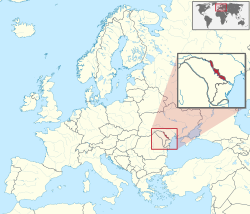Transnistrie
The "Scots" that wis uised in this airticle wis written bi a body that haesna a guid grip on the leid. Please mak this airticle mair better gin ye can. (October 2020) |
Pridnestrovian Moldavie Republic | |
|---|---|
Anthem: Мы славим тебя, Приднестровье (Roushie) My slavim tebya, Pridnestrovye (transliteration) We sang the praises o Transnistrie | |
 | |
| Status | Unrecognised state Recognised bi the Unitit Nations as de jure pairt o Moldovae |
| Caipital and largest city | Tiraspol |
| Offeecial leids | |
| Inter-ethnic leid | Roushie[2][3][4] |
| Ethnic groups (2015 census) |
|
| Demonym(s) | Transnistrian, Pridnestrovian |
| Govrenment | Unitar semi-presidential republic |
• Preses | Vadim Krasnoselsky |
| Aleksandr Martynov | |
| Alexander Shcherba | |
| Legislatur | Supreme Cooncil |
| Pairtially recognised state | |
| 2 September 1990 | |
| 2 Mairch – 21 Julie 1992 | |
• Recogneetion | 3 non-UN membersc |
| Aurie | |
• Total | 4,163 km2 (1,607 sq mi) |
• Water (%) | 2.35 |
| Population | |
• 2015 census | 475,665[5] |
• Density | 114/km2 (295.3/sq mi) |
| Currency | Transnistrie rubled (PRB) |
| Time zone | UTC+2 (EET) |
• Summer (DST) | UTC+3 (EEST) |
| Cawin code | +373e |
| Internet TLD | nonef |
| |
Transnistrie, forby kent as Trans-Dniestr or Transdniestrie is a breakaway territory locatit maistly on a strip o land atween the Dniester River an the eastren Moldovan border tae Ukraine. Since its declaration o unthirldom in 1990, an especially efter the War o Transnistrie in 1992, it is governed de facto as the Pridnestrovian Moldavian Republic (PMR, cried "Pridnestrovie" an aa), an unrecognized state which claims the territory tae the east o the river Dniester as well as the ceety o Bender an its surroondin localities locatit on the wast bank. The modren Republic o Moldovae does no recognize the secession an considers territories controlled bi the PMR tae be pairt o Moldovae's autonomous region o Stînga Nistrului ("Left Bank o the Dniester").[6][7][8] Transnistrie's sovereignty is unrecognized bi ony Unitit Naitions member state an it haes nae diplomatic relations wi them.
Efter the dissolution of the Soviet Union, tensions atween the Moldovan government an the breakaway unrecognized state's authorities in Tiraspol escalatit intae a military conflict that stairtit in Mairch 1992 an wis concludit bi a ceasefire in Julie 1992. As pairt o that agreement, a three-pairty (Roushie, Moldovae, Transnistrie) Joint Control Commission supervises the security arrangements in the demilitarized zone, comprisin 20 localities on baith sides o the river. Although the ceasefire haes held, the territory's poleetical status remains unresolved: commonly considered De jure pairt o Moldovae, Transnistrie is a de facto independent state.[9][10][11][12] It is organized as a presidential republic, wi its awn government, parliament, military, polis, postal seestem, an currency. Its authorities hae adoptit a constitution, banner, naitional anthem, an a coat o airms. Housomeivver, follaein a 2005 agreement atween Moldovae an Ukraine, aw Transnistrian companies seekin tae export guids through the Ukrainian border must be registered wi the Moldovan authorities.[13] This agreement wis implementit efter EUBAM stairtit its activity in 2006. Maist Transnistrians are Moldovan citizens,[14] but there are forby mony Transnistrians wi Roushie an Ukrainian citizenship.
Transnistria is sometimes compared wi ither post-Soviet frozen conflict zones such as Nagorno-Karabakh, Abkhazie, an Sooth Ossetie.[15][16] The latter twae hae recognised Transnistrie as an independent state an hae established diplomatic relations in return for Transnistrie's recognition o them (see Community for Democracy an Richts o Naitions).[17]
References
[eedit | eedit soorce]- ↑ "Конституция Приднестровской Молдавской Республики". Официальный сайт Президента ПМР. Archived frae the original on 25 November 2016. Retrieved 9 Februar 2018.
- ↑ "On the situation of Russian schools in Moldova". OSCE. 14 Julie 2011.
- ↑ "Law of the Moldavian Soviet Socialist Republic on the Functioning of Languages on the Territory of the Moldavian SSR". U.S. English Foundation Research. 2016. Archived frae the original on 21 September 2016. Unknown parameter
|deadurl=ignored (help) - ↑ "Russian language in Moldova could lose their status (Русский язык в Молдове может потерять свой статус)". KORRESPONDENT. 6 Apryle 2013.
- ↑ "Populația Transnistriei a scăzut cu 14,3 la sută". Archived frae the original on 3 August 2017. Retrieved 9 Februar 2018.
- ↑ "CIA World factbook Moldova. territorial unit: Stinga Nistrului (Transnistria)". Archived frae the original on 27 Mey 2012. Retrieved 11 December 2010.
- ↑ Herd, Graeme P. (2003). Security Dynamics in the Former Soviet Bloc. Routledge. ISBN 041529732X. Unknown parameter
|coauthors=ignored (|author=suggested) (help) - ↑ Zielonka, Jan (2001). Democratic Consolidation in Eastern Europe. Oxford University Press. ISBN 019924409X.
- ↑ Jos Boonstra, Senior Researcher, Democratisation Programme, FRIDE. Moldova, Transnistria and European Democracy Policies Archived 2018-08-08 at the Wayback Machine, 2007
- ↑ Gerald Hinteregger, Hans-Georg Heinrich (editors), Russia — Continuity and Change, Hinteregger, Gerald (2004). Russia — Continuity and Change. (editors). Springer. p. 174. ISBN 3211223916. Unknown parameter
|coauthors=ignored (|author=suggested) (help) - ↑ Rosenstiel, Francis (2002). Annuaire Europeen 2000/European Yearbook 2000. Martinus Nijhoff Publishers. ISBN 9041118446. Unknown parameter
|coauthors=ignored (|author=suggested) (help) - ↑ Barry Bartmann, Tozun. Bahcheli (2004). De Facto States: The Quest for Sovereignty. Routledge. ISBN 0714654760.
- ↑ EUROPEAN UNION BORDER ASSISTANCE MISSION TO MOLDOVA AND UKRAINE (EUBAM) Archived 2017-10-16 at the Wayback Machine, November 2007
- ↑ Der n-tv Atlas. Die Welt hinter den Nachrichten. Bertelsmann Lexikon Institut. 2008. page 31
- ↑ OSCE: De Gucht Discusses Montenegro Referendum, Frozen Conflicts, GlobalSecurity.org, Radio Free Europe/Radio Liberty, May 2006
- ↑ Vladimir Socor, Frozen Conflicts in the Black Sea-South Caucasus Region Archived 2013-06-05 at the Wayback Machine, IASPS Policy Briefings, 1 March 2004
- ↑ "Абхазия, Южная Осетия и Приднестровье признали независимость друг друга и призвали всех к этому же". Newsru. 17 November 2006. Retrieved 31 August 2008.
| Wikimedia Commons haes media relatit tae Transnistria. |


